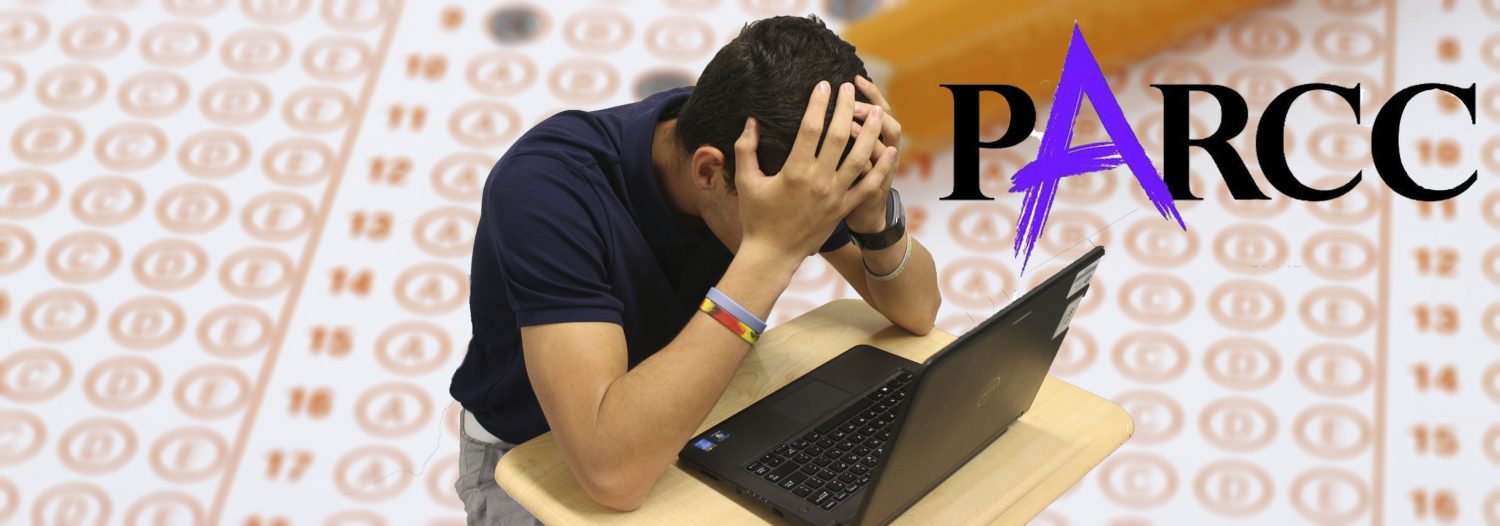Juniors took, or rather endured, the final Language Arts assessment of the new, pilot online standardized test, the PARCC, on April 28.
I put emphasis on “pilot,” because many students chose not to take the test seriously, since it had no real implications for college acceptance, or a pass/fail mark on our high school transcript, like the former Prairie State Achievement Examination or ACT.
Pearson Education created PARCC to assess students’ college and career readiness based on new Common Core State Standards.
Essentially, this is just the same type of concept as the ACT or the SAT, except one gets us into college, and the other minimizes us to lab rats. Though the test may seem meaningless for the Class of 2016, PARCC could be a component in college admissions for students in the distant future. I have to say, I am glad I will be missing the cut-off for that one.
I sit next to the same student for all of my standardized tests. During the ACT, they brought more pencils than I could count, numerous pieces of gum to help them “focus”, and spent the breaks bragging about how well they thought they did on the test. During the PARCC, they senselessly clicked through every answer just to finish, had to be reminded that it was a standardized test (so no, you can’t talk), and then refused to delete a picture they took of the testing materials.
English teacher and PARCC proctor Jessica Thomas felt that since students perceived there was no benefit in doing well on PARCC, many of her students did not put adequate effort toward the test. “People were actively negative and resistant. Probably one-third of the room I proctored did not try, and the way I defined that was finishing in ten minutes or less,” Thomas said.
Students want to work and study hard for AP tests because it can matter for college credit. Students want to visit an ACT tutor on Saturday mornings because the number from 1-36 can define your entire postsecondary education and career plan. However, students are extremely unwilling to put effort toward PARCC.
Beyond logistical issues with PARCC, the test also reveals the need for extrinsic motivators in order for students to work hard. There is a larger issue than Common Core and PARCC in education: students do not care unless there is some sort of score, reward, or points that matter in the end.
“I did not take it seriously because I knew it did not matter for my future with college admissions,” junior Anthony Greco said.
In an informal survey of 50 juniors who took the Language Arts test, not a single student said they took the test as seriously as they would have if it were an ACT or an SAT, and 71 percent said they would have taken it seriously if the score was placed on a high school transcript or used for college admissions.
This obsession with doing the homework, or scribbling down nonsense during the passing period before class to get the points, is not a bad learning habit students have just adapted in high school. Since getting letter-graded report cards in third grade, we have been hard-wired to dedicate ourselves to scoring high on tests and meeting state standards for the ISAT.
“People want to learn to get a good grade, not learn to apply it in the real world,” junior Gabe Berry said.
No, I do not see grades being eliminated from education anytime soon, but we can try to focus greater on education based on student growth rather than extrinsic motivators. One place this is seen currently at Metea is in AP English III, where students present conferences with their teacher demonstrating their growth throughout the quarter and reflecting on what they have learned throughout the year.
“[The AP Language conference] makes you reflect on the hard work, and what you could have worked harder on over the past quarter,” junior Michael Adams said.
More than 800 colleges in the U.S., like DePaul University, have recruited students on a more holistic approach. Rather than denying admission to students because of low standardized test scores, these schools employ test-optional admissions. According to Depaul University, “four years of perseverance, motivation and effort during high school bear a direct relationship to successful college-level work.”
With high schools and colleges moving away from standardized tests, it seems that Pearson tried to take a leap into the future of Common Core, but really took two steps back in education. Even with the flashy highlighter tools and answer eliminator, PARCC is still another biased, uneducated evaluation of students. It may feel like a new test, but PARCC is already a relic of the past.
By Drew Danko








Don • May 14, 2015 at 9:08 am
It’s not only students that need external motivators in order to do well. There is a common expression in the workforce: “Inspect what you expect”. If a work product isn’t going to be validated, looked-at, or otherwise evaluated, it’s likely that it won’t be as good as it could be. Humans can get lazy, especially if they believe that what they’re doing won’t make any difference or if there’s no difference between taking time to do it well and finishing quickly with minimal effort.